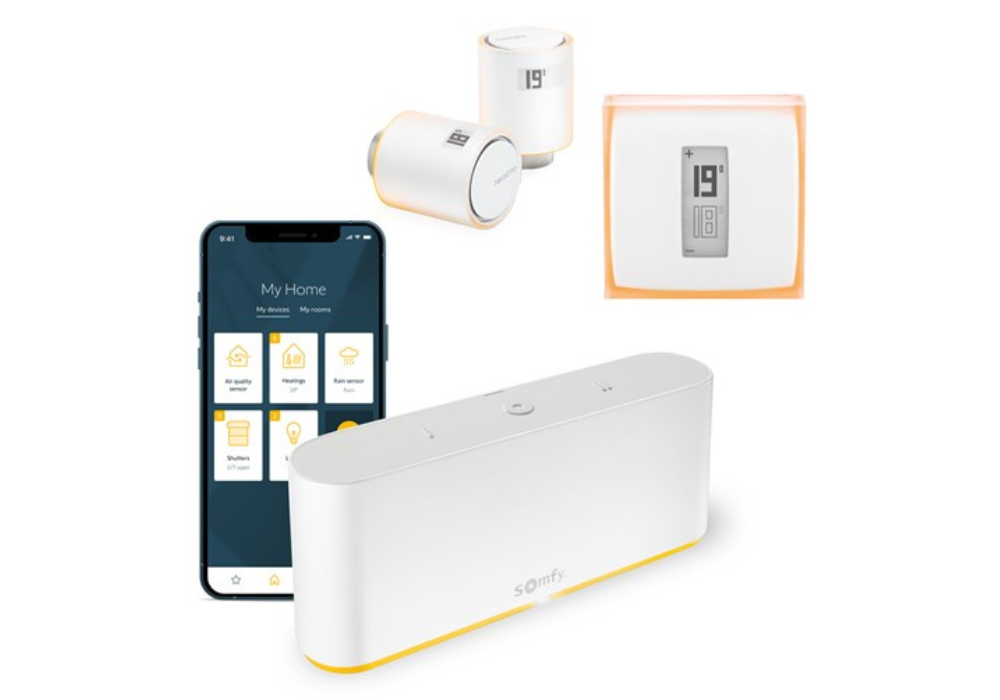
Inteligentny Termostat i Głowice Termostatyczne marki Netatmo kompatybilne z centralą TaHoma switch od Somfy
Odkryj nową Kamerę Domową AdvanceChcę zobaczyć

Wireless home security systems tend to operate using the mobile, landline or WiFi connections that are up and running in your home. By contrast, wired home security kit uses – you guessed it – tangible wiring built into the walls of your home.
These various approaches (actual wiring or mobile, landline or WiFi connections) all ultimately work towards the same end result: ensuring effective communication between the security devices included in your home’s monitoring system.
Wired alarm systems will operate around a central control panel. This control panel – which will likely contain a keypad – is the central hub that responds to alerts from the security kit that you’ve wired up in and around your home. These wired home security components might be motion detectors, security cameras, or door and window opening sensors, for example.
If an intruder triggers these security sensors, your home alarm will go off. Your wired alarm control panel can also be used to activate or disable your home security system.
Whether it’s a wired or wireless home security kit that you go for, make sure everyone living in your home knows how to activate – and turn off – the security alarm.
If you install a wired home security alarm, there won’t be any potentially fallible radio, mobile, landline or WiFi connections involved in your home security system: just good, old-fashioned integrated wiring.
So, we’ve looked at the functional basics of wired home security alarms. But how do they shape up when compared to their wireless counterparts? Time for a closer look at the relative advantages and disadvantages of wired and wireless home security systems.
Many wireless home security devices will rely on a strong mobile or WiFi connection in order to function properly and keep your home safe.
So, if your home is a larger property, you might not be able to create a network that’s strong enough for all the wireless security kit that’s spread out around your home.
If that’s the case for you, you might want to consider a traditional, wired home security system to ensure it effectively works throughout your property.
Wired home security alarms need to be integrated into the walls of your home, so you’ll need to contract a professional home security installation company to fully set up the alarm kit.
Before you decide on your new home security systems, make sure you ask for a quote from the home security company that also covers the cost of installation. That way, you won’t be hit with a home security bill that’s a whole lot higher than you thought!
If you go for wireless home security alarms, you’ll more than likely be able to set them up yourself. Get into DIY mode and install your wireless devices solo, saving on those professional installation costs.
Once your wired security kit is installed, it’s there for good – unless you want to re-wire the entire set-up! If you’re sure that you want a permanent, wired home security system in place, then go right ahead.
If you’re looking for more flexibility in terms of when and where you install your home security devices, go for wireless home security kits. That way, you can continue to expand your wireless home security system – adding wireless motion sensors or security cameras, for example – as your timeframe and budget allow.
Plus, you’ll be able to move your home security kit from one location to another around your home, depending on which zones are most vulnerable. If you’re thinking of eventually adding an extension to your home, wireless home security kits could be the most practical long-term option for you.
Security for your home security – we’re not kidding! Wireless home security devices give you added flexibility, as they’re easy to move wherever you like around your home.
But, this also means that the same applies to people who might be looking to tamper with your home security kit. With wired home security systems, burglars can’t just remove your home security kit from wherever it is around your home.
Wired security systems offer fewer options in terms of smart, remote control. Wireless smart home security alarms can often be linked up to motion detectors, door and window opening sensors and security cameras, which will send a real-time security alert to an app on your smart devices.
That means you’ll be able to remotely trigger, or turn off, your home security alarms anytime, from anywhere.
However, some wired home security systems do allow you to add several telephone numbers into your home security alarm control centre. That way, you can be notified with a call in the event of a security incident at your home.
If you move from home to home fairly often – whether that’s buying or renting – you’ll probably want to consider going for a wireless home security system. That way, you can move your home security kit with you wherever you move to: buy once and re-install wherever your next home is.
But, if you know you’re staying put in your home for the long run, a wired security alarm system could be the ideal option for you and your family. What’s more, if you’re moving into a home that’s currently under construction, you’ve got the perfect opportunity to integrate a wired home security system right into the walls of the property.
In essence, if tradition is what makes you feel comfortable, go ahead and install a wired security alarm system. On the other hand, if it’s adaptability and flexibility that you’re looking for in your home security systems, then Netatmo reckons it’s a wireless home security system for you.